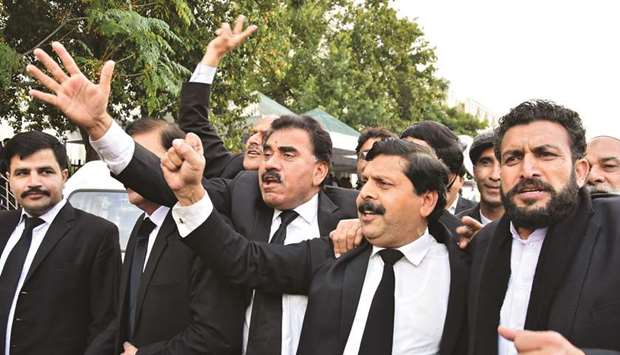The Supreme Court has allowed the country’s powerful army chief to continue in his role for another six months, rejecting a government request to keep him on for three more years.
A three-judge bench in the capital Islamabad also ordered the government to remove ambiguities in laws that govern how long the head of the military can keep the job.
Army chief General Qamar Javed Bajwa was set to retire today – the end of his original term – but Prime Minister Imran Khan said he wanted the general to remain in his post for three more years.
The court ordered a shorter extension.
Chief Justice of Pakistan Asif Saeed Khosa announced the decision after a three-day hearing that gripped political circles and the population as a whole.
“The federal government will make the necessary legislation in this matter,” Attorney-General Anwar Mansoor assured the court.
The undertaking states that the parliament will draft legislation on the issue of an army chief’s tenure within six months.
The chief justice had earlier instructed that “parliament should pass legislation on the matter within six months. If the legislation is not passed during the given time, the appointment will become illegal”.
Apparent support from the military, and especially Bajwa, was seen as one of the factors that brought Khan’s Pakistan Tehreek-e-Insaf (PTI) party to power in elections last year.
Earlier, Chief Justice Khosa remarked: “We have been told that a general never retires. If a general never retires, then there must be no pension, and if there is no retirement for generals, then what is their mode of earnings?”
“How is the appointment that took place today different from the previous ones? You will have to convince us, how the latest appointment is accurate,” he continued.
“Extensions were happening in the past, but no one took notice of it. No one is watching what is happening in cantonments. Under which law does this practice continuing? Now a constitutional institution is reviewing this matter,” Khosa asked. “The appointment procedure should be clearly written on the constitutional post.”
The army chief usually serves a three-year term.
Since the role was established in 1972, only one general has had his term extended by a civilian government.
Pakistani generals have ruled the country for almost half of its existence since the South Asian nation gained independence from Britain in 1947.
The national union of lawyers held a strike yesterday to protest against the extension.
“Considering that the (army chief) is responsible for the command, discipline, training, administration, organisation and preparedness for war of the army... we, while exercising restraint, find it appropriate to leave the matter to the parliament,” Chief Justice Asif Saeed Khosa told the court.
Prime Minister Khan celebrated the court’s decision.
“Today must be a great disappointment to those who expected the country to be destabilised by a clash of institutions,” the prime minister tweeted moments after the ruling.
But the episode has damaged Khan’s administration, which is seen as close to Bajwa.
“This is a landmark case: unprecedented questions are being raised, threatening to upend the accepted status quo, and holding a mirror to society’s psyche,” Pakistan’s leading English daily Dawn wrote in an editorial earlier yesterday.
“This is without a doubt the most shambolic episode in the PTI government’s tenure so far,” said the editorial. “Surely there are other officers more than capable of leading the army. General Bajwa’s next step will determine whether he is thinking of himself or his institution.”
Bajwa, considered by some to be the most influential figure in Pakistan, has worked directly with the United States and Afghanistan on a proposed peace deal with the Taliban militant group.
Bajwa met US President Donald Trump this summer and has also met Afghan President Ashraf Ghani several times to help set up talks with the Taliban.
Bajwa ordered the release of Taliban leader Abdul Ghani Baradar, who is now spearheading stalled talks with the US as head of the militia’s political wing.
He was appointed to lead the military in 2016, taking over from the massively popular General Raheel Sharif, who won the hearts of millions with his blistering fight against Islamist militants.
Since taking power, Bajwa and the military have been criticised for continuing a crackdown on civil society while also being accused of helping engineer Khan’s victory in the 2018 elections.
The government itself is facing growing anger as it struggles to prop up Pakistan’s economy after decades of corruption and mismanagement.
Bajwa is the latest in a long line of Pakistani military generals who have seen their mandates extended.
The ruling comes as tensions have skyrocketed with New Delhi after Indian Prime Minister Narendra Modi stripped the disputed Kashmir region of its autonomy over the summer, which Khan’s government cited as its primary reason for the extension.
Both India and Pakistan have controlled portions of the former princely state of Kashmir since independence in 1947.
The dispute over the Muslim-majority region has been the spark for two major wars and countless clashes between the countries.

Lawyers supporting army chief Bajwa chant slogans in reaction to the Supreme Court ruling.
